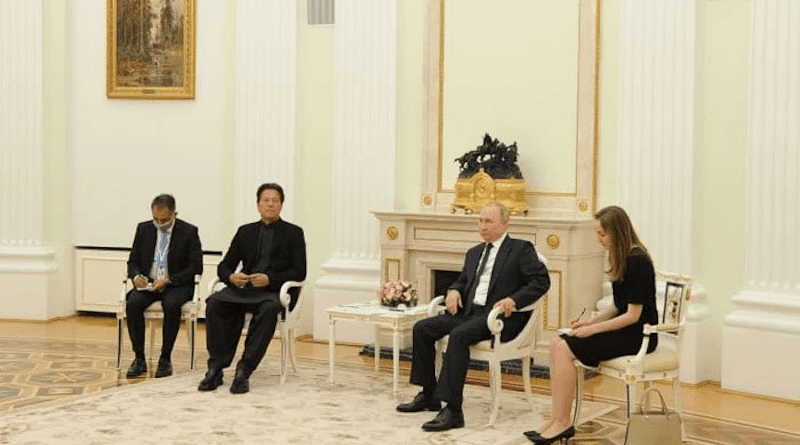Economic Repercussions Of Russia-Ukraine Crisis On Pakistan – OpEd
By Saima Afzal
Geographically, Ukraine has strategic importance in Europe and until the disintegration of Soviet Russia and Ukraine were part of the Soviet Union. The current Russia-Ukraine conflict started when Russia’s attempted to prevent the country from joining NATO as it poses a threat to its national security. Basically, Moscow wants to keep Ukraine in its bloc, arguing it would be a threat to Russian security if it joins NATO. However, Russia invaded Ukraine to keep it under its influence on 24 February 2021. Unfortunately on that time, Pakistan’s Prime Minister Imran Khan was on its official visit to Russia to enhance bilateral trade and cooperation between the both states. Irrespective of the reality, Pakistani Prime Minister’s visit came under sever scrutiny whereas the visit was decided and planned months before. Various analysts questioned the timing of the visit, as apparently it gave the wrong signals about where Pakistan stood diplomatically in the Russian and Western confrontation.
Pakistan’s stance on the matter has been neutral as it abstained from voting at the UNGA in favour of a resolution, tabled by the US, calling on global powers to condemn Russia for waging a war in Ukraine. Therefore, Pakistan does not interfere in the internal affairs of any states and on Ukraine-Russia conflict Pakistan stressed that both states should diplomatically resolve their issue. Even in the recent 48th OIC summit Pakistan’s Prime Minister has urged foreign ministers of Muslim-majority nations to “mediate, try to bring about a ceasefire and an end to the conflict between Russia-Ukraine, also requested China’s top diplomat to join the effort. He also highlighted that the war in Ukraine “could have worst consequences for the world”. Beside this, Khan warned and added that the rest of the planet is “already suffering” with surging prices of oil, gas and wheat from a region known as the breadbasket of the world.
Pakistan had bilateral economic and trade ties with both Russia and Ukraine. During 2021, Pakistan’s trade with Russia was $711 million including $537 million in imports from Russia. Likewise, Pakistan’s bilateral trade with Ukraine was valued at $800 million with receiving $739 million in imports in 2021. Pakistan has imported 39 percent of wheat from Ukraine in the previous fiscal year, consequently Pakistan’s wheat import will be directly affected by the crisis. Though, the indirect cost of the crisis in terms of global energy and commodity supply chains is expected to outweigh Pakistan’s direct trade losses with Russia and Ukraine.
Infact, the Russia-Ukraine conflict has shaken the world economies in several ways. Like, the United States and Europe’s enforced sanctions on Russia are likely to disrupt energy supplies from the world’s largest supplier. As a result of which, the energy prices have already soared to over seven-year highs. After spiraling as high as $101.95, the Brent crude futures contract lost $1.15, or 1.2 percent, to close at $97.93 a barrel. This is a major setback for an oil-importing country like Pakistan, as the commodity accounts for a sizable share of its imports. According to political analysts, a $10-20 per barrel increase in oil prices over a few quarters is projected to deplete our national reserves by $1-2 billion, thus further shrinking the country’s purchasing power.
Furthermore, a prolonged conflict in Ukraine is negative for Pakistan because in the previous year it imported 39 percent of wheat from Ukraine and is dependent on Ukraine for imports of commodities such as seeds, barley, and grain. Hence, the existing conflict in Ukraine may disrupt supply chains of these essential items and push the inflation rate higher in the country. Moreover, if Western countries impose sanctions on Russian oil supplies, oil prices are likely to rise more. Resultantly, the conflict may likely aggravate the situation and contribute to higher inflation in Pakistan. In such scenario, the Pakistani rupee would potentially depreciate rapidly and would force the State Bank of Pakistan (SBP) to tighten its monetary policy. These circumstances will have a negative impact on the living standards of Pakistani citizens. Pakistan must play its cards carefully and maintain its neutrality instead of indulging with Russia and the West. Pakistan must not become a part of any political bloc and sideline any state for the interest of others.
In the evolving geopolitics, Pakistan must improve its ties with Asian countries and maintain mutually beneficial ties with all major powers, including the US, Europe, China and Russia. Pakistan’s economy is mainly agrarian and to avoid any economic disaster in the current scenario Pakistan should be self-reliance and focus on its agriculture sector.
* The writer is Islamabad based analyst and can be reached at [email protected].

